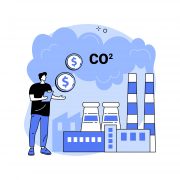As I have researched, contemplated and written about climate change over the past months, the thing that has hit me almost more than anything else is how vital it will be to connect the theory of decarbonising with the practice.

The foundations of a carbon currency are already taking shape
I have discussed what makes the financial services industry so well placed to help the world tackle climate change in previous articles. From regulation to reporting, scale, systems and globality, it checks the boxes for being fit for purpose – for helping to put in place what is needed.
Financial services are also integral to the daily experiences of ordinary people. Money and modern life are intrinsically linked. We are what we spend!
Carbon is almost certainly involved in everything we consume; from the moment we snooze our alarm clocks in the mornings to the second we switch off our bedside lamps in the evening.
Linking currency to carbon could open the door to a better and more sustainable economy.
Redefining “value”
Of course, energy, food, clothes, transport, housing and entertainment all have a carbon footprint. And quantifying that footprint will be essential to lowering it. Connecting decarbonisation with money is a logical step. It could create a universal way to credit decarbonisation and penalise emissions. Clearly, if carbon became a new form of currency, its value would go far beyond the financial.
But making this work would require a wholesale reassessment of our views on value. Take a field up for sale, for instance. Today, the average field in the UK is valued for its use. Pasture, relatively low. Farmland, a bit high. Real-estate potential, off the scale.
However, with a new outlook, the field could be valued for its potential to reduce carbon and improve biodiversity (which further helps with carbon management). The decarbonisation attributes of a simple field may be even more lucrative than its value for housing.
Putting a price on everyday carbon
So, how could this be represented? Monetary value is easy… But carbon value!? That’s a whole different ball game. Anything more complex than a single figure would be unfair.
However it’s determined, the figure would need to convey value and have a mechanism for conferring that value between buyer and seller, which by definition is a currency. I am not an economist, so I would not know where to start, but it will need to be considered, and a solution found.
Meanwhile, the foundations of a carbon currency are being put in place through carbon trading and crypto.
Building upon the existing carbon markets
There is a long history of carbon trading. Starting in the early 2000s, countries began instigating mandatory schemes such as Emission Trading Systems (ETS) and International Carbon Markets and forming Voluntary Carbon Markets.
Carbon trading is now a significant industry. According to the CFA Institute, in 2019, the traded value of three major ETS programmes—the EU ETS, the Regional Greenhouse Gas Initiative (RGGI) and the Western Climate Initiative (WCI)—exceeded $250 billion.
So, what is an ETS? Essentially it is a trading system that works on a ‘cap and trade’ principle. A government sets the legal limit for emissions (the cap) over a specified period and grants a fixed number of permits to companies or facilities for their emissions.
A facility must hold enough permits to cover the emissions it releases, and unused permits can be rolled over or sold. If emissions exceed permits for the specified periods, the facility incurs heavy penalties.
All of these cap and trade schemes involve offset credits. These are credits that can be acquired from countries or industries outside of the cap, usually in the developing world. Polluters can then exceed their emissions cap by paying someone else to reduce their emissions instead. In theory, a facility or company can continue to pollute and offset its way to lower emissions. Paying to pollute is a controversial but common practice.
Increasingly, offsetting is finding its way into the realms of the consumer. Most airlines now offer an offsetting option for the emissions on a flight. These schemes’ variety and varying quality speak to the offsetting market’s inherent problems, both at a consumer and commercial level.
Overall, the indirect nature of offsets means that they are often difficult to measure and validate. Enter bad players who can use these weaknesses for profit. A carbon currency could undoubtedly build on existing systems but resolving these issues will be essential for building trust in any carbon system. The systems need to be transparent, auditable, open and global.
Could crypto save the planet?
According to CoinGecko, the cryptocurrency market is worth over $3 trillion. Bitcoin, the most famous, has a terrible reputation regarding energy usage, and therefore has irrevocably damaged its green credentials. For example, one of the reasons cited by China for banning Bitcoin mining was that it accounted for just over 1% of the entire country’s energy consumption.
But Bitcoin was born out of a blockchain-based standard. The way Bitcoin was implemented did not take energy consumption into account. But blockchain does offer the possibility of ultimate transparency and peer-to-peer transactions. Plus, when implemented in the right way, blockchain solutions offer incredible energy efficiencies.
These features of blockchain make it compelling as the starting point for a carbon currency. Cryptocurrencies are global and traded continuously. To work conceptually, a carbon currency would have to be global, so I predict it will almost certainly be a cryptocurrency of some description.
Crypto-sceptics may need to have an egg ready to fry on their face, because one day, this technology might just save our planet.
About the author
 Dave Wallace is a user experience and marketing professional who has spent the last 25 years helping financial services companies design, launch and evolve digital customer experiences.
Dave Wallace is a user experience and marketing professional who has spent the last 25 years helping financial services companies design, launch and evolve digital customer experiences.
He is a passionate customer advocate and champion and a successful entrepreneur.
Follow him on Twitter at @davejvwallace and connect with him on LinkedIn.
Credit: Source link


Comments are closed.